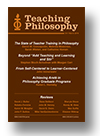|
articles |
|
1.
|
Teaching Philosophy:
Volume >
33 >
Issue: 4
Christopher P. Long
Cultivating Communities of Learning with Digital Media:
Cooperative Education through Blogging and Podcasting
abstract |
view |
rights & permissions
| cited by
Digital media technology, when deployed in ways that cultivate shared learning communities in which students and teachers are empowered to participate as partners in conjoint educational practices, can transform the way we teach and learn philosophy. This essay offers a model for how to put blogging and podcasting in the service of a cooperative approach to education that empowers students to take ownership of their education and enables teachers to cultivate in themselves and their students the excellences of dialogue. The essay is organized around a compelling story of how the students in an Ancient Greek Philosophy course responded to an anonymous, belligerent commenter on the blog from outside of the class. The incident brings the pedagogy of cooperative education into sharp relief.
|
|
|
|
|
2.
|
Teaching Philosophy:
Volume >
33 >
Issue: 4
Heidi Giebel
Ethics without Controversy?
abstract |
view |
rights & permissions
| cited by
In this article I argue that, despite my previous strongly held beliefs to the contrary, a focused-theory approach to teaching Introductory Ethics (meaning that one theory or family of theories is the main focus of the course) is a legitimate and effective way to introduce undergraduate students to philosophical ethics. There are at least three advantages to the focused-theory approach to teaching ethics: increased depth of learning, avoidance of relativism (or “theory-relativism”) as a default position, and opportunity for moral education. There are some obvious objections to a focused-theory course—that skipping inter-theoretical controversy lessens opportunity for argument analysis and contemporary application, that lack of exposure to all of the major ethical theories is a disadvantage for grad school–bound students, and that a focused-theory approach amounts to indoctrinating students by teaching one’s favorite theory as though it were the only theory; but each objection can be addressed effectively.
|
|
|
|
|
3.
|
Teaching Philosophy:
Volume >
33 >
Issue: 4
Nathan Andersen
Filmmaking in the Philosophy Classroom:
Illustrating the Examined Life
abstract |
view |
rights & permissions
| cited by
Film is frequently employed in philosophy classes to illustrate philosophical themes. I argue that making short films or videos in the philosophy classroom can also be a valuable learning exercise for philosophy students. One such assignment, focused on showing the relevance of philosophy to everyday issues, is described and defended here. The exercise is valuable both as a way to clarify the character of philosophical inquiry and its connection to life, and also because questions about film as a medium relate directly to concerns of the major traditional branches of philosophy.
|
|
|
|
|
review article |
|
4.
|
Teaching Philosophy:
Volume >
33 >
Issue: 4
Reshef Agam-Segal
Four Introductory Books in Ethics
abstract |
view |
rights & permissions
| cited by
What do we aim at when we teach general introductory courses in moral philosophy? What should we aim at? In particular, should we focus on practice or theory? Should we make the study of ethics easy for the students, or should we alternatively aim at making the hardness of ethics attractive to them? This review discusses four recently published textbooks in ethics designed for beginners’ level courses. The books are different in organization and emphases. In each case, I have given a short overview of the book’s contents, its aims and methods. I have also made some assessment about the usefulness of each: the philosophical territory it covers, the philosophical approach it puts forward, and the amount of preparation-work it leaves with the teacher. My overview thus gives the necessary information, and creates for the teacher the occasion for reflecting on—leaves the teacher with the task of deciding—what and how they want to teach.
|
|
|
|
|
reviews |
|
5.
|
Teaching Philosophy:
Volume >
33 >
Issue: 4
R. Eric Barnes
Philosophy:
An Innovative Introduction, Fictive Narrative, Primary Texts and Responsive Writing
view |
rights & permissions
| cited by
|
|
|
|
|
6.
|
Teaching Philosophy:
Volume >
33 >
Issue: 4
Jason Decker
Philosophy of Language:
A Contemporary Introduction (2nd ed.)
view |
rights & permissions
| cited by
|
|
|
|
|
7.
|
Teaching Philosophy:
Volume >
33 >
Issue: 4
Richard W. Field
Dewey
view |
rights & permissions
| cited by
|
|
|
|
|
8.
|
Teaching Philosophy:
Volume >
33 >
Issue: 4
Daniel Groll
Peter Singer Under Fire:
The Moral Iconoclast Faces His Critics
view |
rights & permissions
| cited by
|
|
|
|
|
9.
|
Teaching Philosophy:
Volume >
33 >
Issue: 4
George S. Matejka
Why We Love Dogs, Eat Pigs and Wear Cows:
An Introduction to Carnism
view |
rights & permissions
| cited by
|
|
|
|
|
10.
|
Teaching Philosophy:
Volume >
33 >
Issue: 4
James M. Okapal
This Is Ethical Theory
view |
rights & permissions
| cited by
|
|
|
|
|
11.
|
Teaching Philosophy:
Volume >
33 >
Issue: 4
Dustin Tucker
Education for Thinking
view |
rights & permissions
| cited by
|
|
|
|
|
12.
|
Teaching Philosophy:
Volume >
33 >
Issue: 4
Aladdin M. Yaqub
An Introduction to Non-Classical Logic
view |
rights & permissions
| cited by
|
|
|
|
|
|
|
13.
|
Teaching Philosophy:
Volume >
33 >
Issue: 4
Volume 33 Index
view |
rights & permissions
| cited by
|
|
|
|
